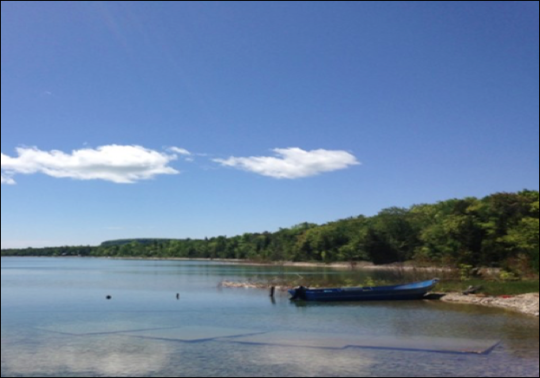By Dr. Kristen Lowitt
Re-establishing access to traditional foods is recognized as a central pillar of achieving food security and food sovereignty for Indigenous communities across Canada (Food Secure Canada, 2015). For the Saugeen Ojibway Nation (SON) in Ontario[1], engaging in wild harvest activities throughout their traditional territory on the Saugeen (Bruce) Peninsula and the waters of Lake Huron and Georgian Bay has long been vital to their food systems, culture, and trade (LaRiviere & Crawford, 2014). Fishing is of particular significance to the Saugeen Ojibway peoples, with the Ontario Supreme Court reaffirming in 1993 that SON has an Aboriginal and treaty right to fish for commercial and sustenance purposes within their traditional territory (R vs. Jones & Nadjiwon, 1993).
In this context, a study (2015-17) was undertaken to look at the relationships between access to fisheries within SON’s traditional territory and outcomes for food security. Discussions to undertake the study began between myself, then a Postdoctoral Fellow at McGill University and the Saugeen Ojibway Nation in Fall 2015. From the outset, it was agreed that the First Nations ethical principles of Ownership, Control, Access and Possession (OCAP) would guide the partnership as a way of supporting SON’s self-determination over the research.

Fishing boat on the shore of Lake Huron in the Chippewas of Nawash Unceded First Nation.
Following the development of a research proposal and the establishment of a research team (consisting of myself, my postdoctoral research supervisor, and staff members from the Saugeen Ojibway Nation), fieldwork was undertaken in the SON territory in summer 2016. I led these efforts working closely with David Johnston-Weiser, the Commercial Fisheries Business Manager in the SON Environment Office and with two SON summer students. Our main method of data collection consisted of focus groups involving 28 household members to understand their experiences in accessing local fish. We also undertook 16 interviews with elders, fish harvesters, and community decision-makers exploring their different perspectives related to traditional food practices, sustainable livelihoods, and fisheries management and policy.
After collecting these data, we continued working together as a research team throughout the analysis and writing process. We also undertook a set of community knowledge-sharing workshops to share and validate findings. Recently, following the community’s approval of the research findings, the results of our study have been published in the Journal of Great Lakes Research.
A key finding from the study is that while access to fish for food security depends on SON’s legal rights to the water (such as their right to fish as reaffirmed in the 1993 Ontario Supreme Court case) these are not sufficient to deriving food security benefits. Rather, in the wake of the disruptive impacts of colonialism, more attention needs to focus on strengthening the relational mechanisms that may enable SON to make better use of their legal rights, such as enhanced transfer of inter-generational fishing knowledge, stronger community sharing networks, and ensuring SON’s full participation in fisheries management and policy. Here, the ongoing impacts of colonialism figured prominently in discussions, as described by an elder:
“A lot of people have lost their language. You can’t translate what the Ojibway say into English and get the feeling of how it’s attached to the cycle of nature.”
This study was the first time I had the opportunity to work with an Indigenous community in research. One of the most important things I learned is that taking the time to build relationships and trust, based in ethical principles that enable Indigenous self-determination, is fundamental. I learned a lot personally and professionally from my collaborators, and it’s my hope that this work contributes to SON’s efforts towards enhanced self-determination and food sovereignty in their territory.
Moving forward, I hope to develop more community-based research partnerships around the Great Lakes. My current project is focusing on sustainable food and fisheries governance in the Lake Superior region as a member of the Food: Locally Embedded Globally Engaged research network.
[1] SON is the shared name for two communities that share this traditional territory: The Chippewas of Nawash Unceded First Nation and the Saugeen First Nation.
Kristen is currently Assistant Professor, Department of Geography and Environment, Mount Allison University. Her research focuses on the interactions between food security, natural resource management and communities in rural and coastal contexts. She can be contacted at: klowitt[at]mta.ca.

0 Comments